In this Tuesday, Oct. 27, 2015, photo a woman walks past election banners with pictures of Turkey's main opposition Republican People's Party leader Kemal Kilicdaroglu, left, and Turkish Prime Minister Ahmet Davutoglu, the leader of the Justice and Development Party (AKP), in Istanbul. The election is a redo of June elections in which the ruling AKP, stunningly lost its majority. Turkish President Recep Tayyip Erdogan called for new elections after Davutoglu failed to form a coalition with any of the three opposition parties represented in parliament. (AP Photo/Emrah Gurel)
The Associated Press
ISTANBUL (AP) - As extremist violence and political uncertainty cast a shadow over Turkey, voters are looking for Sunday's parliamentary election to usher in stability. But in a deeply polarized country, the most likely result is more confusion.
The election is a redo of June elections in which the ruling Justice and Development Party, or AKP, stunningly lost its majority. President Recep Tayyip Erdogan called for new elections after Prime Minister Ahmet Davutoglu failed to form a coalition with any of the three opposition parties represented in parliament.
The ballot comes at a sensitive time for Turkey, a key Western ally that has major issues to navigate: It faces rising instability in neighboring Syria and Iraq and a refugee crisis that is spilling into Europe. There are also doubts about the country's once-booming economy - concerns exasperated by political deadlock and violence damaging the key tourism sector.
With analysts expecting a similar inconclusive result in Sunday's election, the key question is whether Erdogan would allow his party to form a coalition. Doing so would effectively force Erdogan to relinquish his iron grip on power in Turkey.
There is a small chance that he won't have to. In the June elections, AKP won just over 40 percent of votes, falling 18 seats short of the 276 needed for an outright majority. AKP is now hoping it can cover the distance and eke out a slight majority by targeting some of the constituencies that it lost narrowly.
The June election showed that Erdogan's biggest problem is the rise of the main Kurdish party, or HDP. For the first time, HDP easily cleared the 10 percent threshold needed for representation as a party in parliament, taking seats mostly at AKP's expense.
In the immediate aftermath of the election, the worst violence in years broke out in Turkey between Kurdish militants and government authorities. Two massive suicide bombings at pro-Kurdish gatherings apparently carried out by an Islamic State group cell severely heightened tensions. Kurds charge that the government failed to secure the events, while Erdogan and other AKP leaders alleged - without offering evidence - that the bombings were planned by a "cocktail" of Turkish enemies that included Islamist IS and the staunchly secular Kurdistan Workers' Party, or PKK.
In the violence, one of Erdogan's most notable accomplishments - peace talks with the PKK to end decades of violence and integrate the Kurdish southeast - has come undone. Erdogan has lashed out at the HDP, calling it the political arm of the PKK, which Turkey and most Western countries consider a terrorist organization. The election could give a signal on the direction of the peace process.
"A decline in (HDP's) public support will be an indication of the decline in public support for the (peace) process," said Giray Sadik, associated professor at Ankara's Yildirim Beyazit University. He added that given the sensitivities there will be close observation from both sides of the security of ballots in the Kurdish southeast. "Even relatively minor incidents may disturb the balance and are likely to raise questions about the legitimacy of the elections."
In ordering new elections, Erdogan appeared to calculate that Turkish voters would conclude that returning AKP to a majority was the country's only chance of regaining stability and strong growth. Davutoglu has been campaigning against a coalition, while Erdogan has played a quieter role after barnstorming the country ahead of the June vote.
"Their claim is that currently Turkey is unstable because AKP has lost its majority, and whatever negative development is taking place in Turkey right now is taking place because AKP has lost its majority," says Ozgur Unluhisarcikli, the Ankara director of the German Marshall Fund.
But that's a hard argument to make with an AKP caretaker government in place after 13 years of majority rule. It may be hard to win back lost voters, especially among a large number of religious Kurds who had backed AKP in previous elections.
To better steer the precarious situation, Erdogan has tightened his control over his own party. Under the Turkish constitution, the president is meant to stay out of party politics and mostly above the political fray. But Erdogan has argued that as the first directly elected president, he has a moral mandate to lead the country. When he left his position as prime minister and head of his party in 2014 to assume the presidency, Erdogan took a gamble that AKP could win a sufficiently large majority to change the constitution and endow the presidency with broad new powers. With that strategy in tatters, he hopes that even with a small majority, he can guide parliament from the presidential palace.
At a party conference after the June elections, Erdogan managed to install his own loyalists among the party hierarchy and on the list of candidates for Sunday's poll. This came at Davutoglu's expense. Now, ironically, a disappointing result on Sunday could empower Davutoglu to form a coalition with the opposition, independent of Erdogan, who would be weakened by a slip in the polls.
As in past elections, Erdogan's great advantage is that there is no comparable opponent in Turkish politics. The opposition remains fractured and comparably weak, with the next largest party, the secularist CHP, garnering only 27 percent in the June elections. Even if AKP slips a few points on Sunday it will remain the largest party, and leader of any conceivable coalition.
But analysts have doubts that Erdogan would give Davutoglu a free hand to negotiate a stable deal with the CHP, HDP or the nationalist MHP. If the results are bad, he may look for early elections again. But it's hard to see why a third try would solve Erdogan's problem.
____
Fraser reported from Ankara
___
Follow Butler and Fraser at https://twitter.com/desmondbutler and https://twitter.com/suzanfraser
FILE - In this May 30, 2015, file photo, supporters of Turkey's president, Recep Tayyip Erdogan, and prime minister and leader of the Justice and Development Party (AKP), Ahmet Davutoglu, some holding Turkish flags, wait for their appearance in Istanbul during a rally to commemorate the anniversary of city's conquest by the Ottoman Turks. As extremist violence and political uncertainty cast a shadow over Turkey, voters are looking for the parliamentary election to usher in stability. (AP Photo/Lefteris Pitarakis file)
The Associated Press
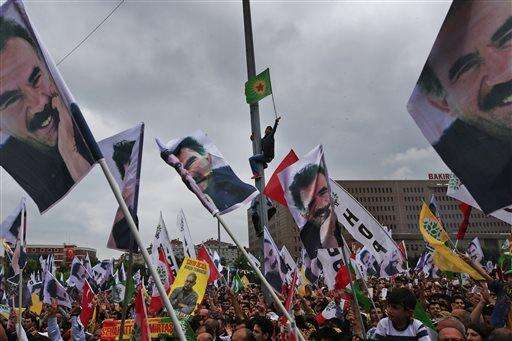
FILE - In this June 8, 2015, file photo, supporters of the pro-Kurdish Peoples' Democratic Party (HDP) cheer as others wave flags of imprisoned Kurdish rebel leader Abdullah Ocalan during a rally in Istanbul. As extremist violence and political uncertainty cast a shadow over Turkey, voters are looking for Nov. 1. 2015, parliamentary elections to usher in stability. The election is a redo of June elections in which the ruling Justice and Development Party, or AKP, stunningly lost its majority. The ballot comes at a sensitive time for Turkey, a key Western ally that has major issues to navigate. (AP Photo/Lefteris Pitarakis, file)
The Associated Press
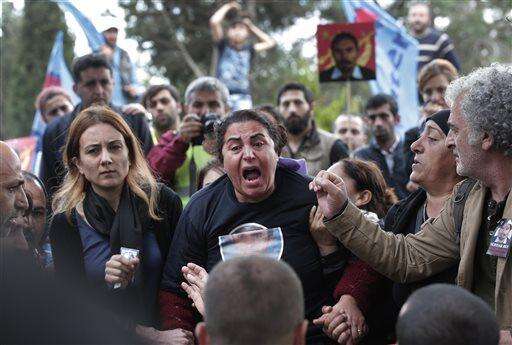
FILE - In this Thursday, Oct. 15, 2015, file photo, a relative of Serdar Ben, 33, one of the victims of Oct. 10 bombings in Ankara, Turkey's deadliest attack in years, bursts into tears during his funeral in Istanbul. As extremist violence and political uncertainty cast a shadow over Turkey, voters are looking for Nov. 1, 2015, parliamentary election to usher in stability. The ballot comes at a sensitive time for Turkey, a key Western ally that has major issues to navigate. (AP Photo/Lefteris Pitarakis, file)
The Associated Press
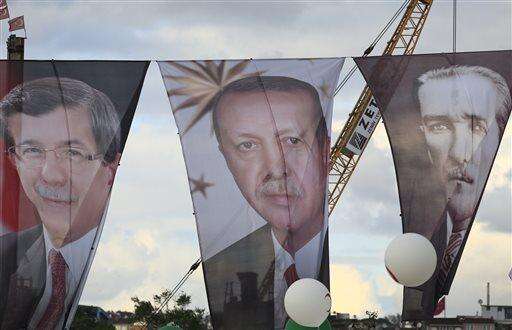
FILE - In this Sunday, Oct. 25, 2015, file photo, banners from left to right show Turkish Prime Minister Ahmet Davutoglu, also leader of the Justice and Development Party (AKP); Turkey's current President Recep Tayyip Erdogan' and Turkish Republic founder Mustafa Kemal Ataturk, during a rally of supporters of Davutoglu in Istanbul, ahead of the Nov. 1 general elections. As extremist violence and political uncertainty cast a shadow over Turkey, voters are looking for the parliamentary election to usher in stability. (AP Photo/Lefteris Pitarakis, file)
The Associated Press
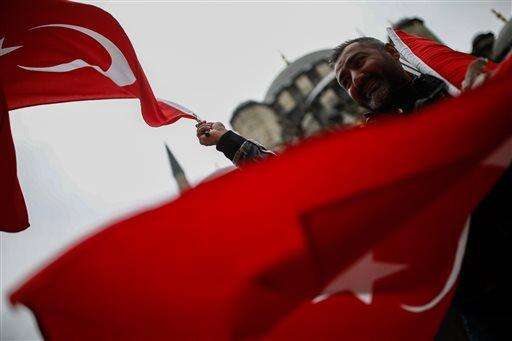
A vendor sells Turkish flags for party supporters near a mosque in Istanbul, Tuesday, Oct. 27, 2015, ahead of the Nov. 1 general elections. As extremist violence and political uncertainty cast a shadow over Turkey, voters are looking for Sunday's parliamentary election to usher in stability. The ballot comes at a sensitive time for Turkey, a key Western ally that has major issues to navigate. (AP Photo/Emrah Gurel)
The Associated Press
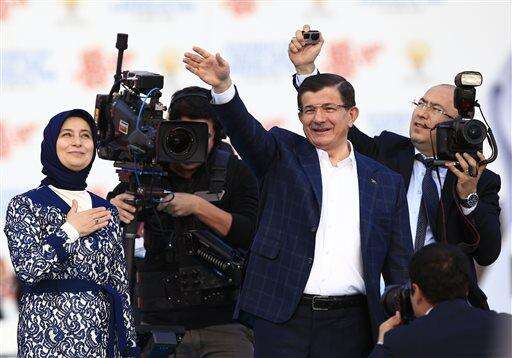
In this Sunday, Oct. 25, 2015 photo, Turkish Prime Minister Ahmet Davutoglu , right, also leader of the Justice and Development Party (AKP), accompanied by his wife, Sare, left, waves to his supporters as he arrives to deliver a speech at a rally in Istanbul, ahead of the Nov. 1 general elections. As extremist violence and political uncertainty cast a shadow over Turkey, voters are looking for the parliamentary election to usher in stability. The ballot comes at a sensitive time for Turkey, a key Western ally that has major issues to navigate. (AP Photo/Lefteris Pitarakis)
The Associated Press
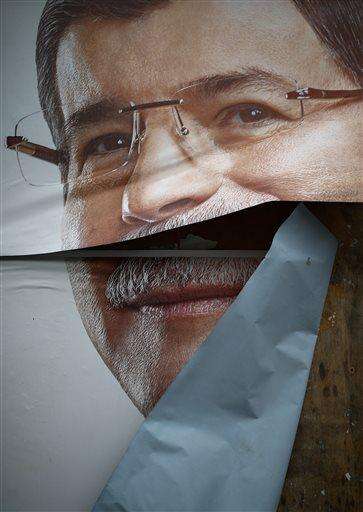
In this Tuesday, Oct. 27, 2015, photo, an election banner with a picture of Turkish Prime Minister Ahmet Davutoglu, leader of the Justice and Development Party (AKP), is seen torn in Istanbul, ahead of Sunday elections. As extremist violence and political uncertainty cast a shadow over Turkey, voters are looking for the parliamentary election to usher in stability. The ballot comes at a sensitive time for Turkey, a key Western ally that has major issues to navigate. (AP Photo/Emrah Gurel)
The Associated Press
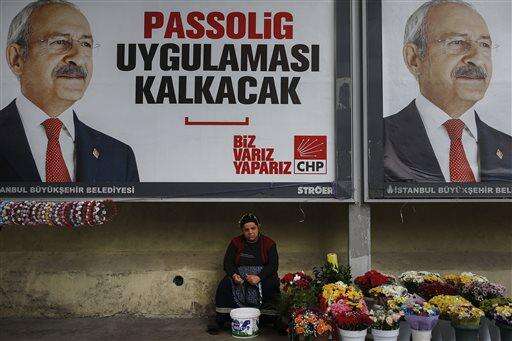
In this Tuesday, Oct. 27, 2015 photo, a vendor sales flowers under election banners with pictures of Turkey's main opposition Republican People's Party leader Kemal Kilicdaroglu in Istanbul, ahead of Nov. 1 elections. The banner reads in Turkish: "Passolig administration will be removed" referring to one of the party's election campaign pledges to cancel the obligatory card which soccer supporters use to enter the stadia for Turkish League matches. As extremist violence and political uncertainty cast a shadow over Turkey, voters are looking for the parliamentary election to usher in stability. (AP Photo/Emrah Gurel)
The Associated Press
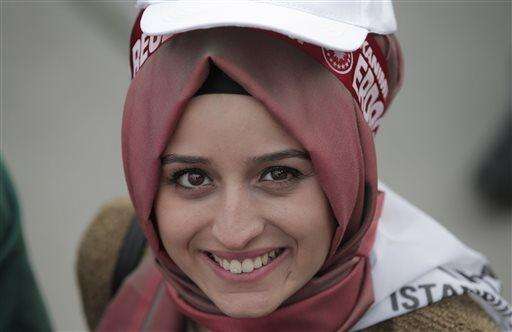
FILE - In this Sunday, Oct. 25, 2015, file photo, a supporter of Turkish Prime Minister Ahmet Davutoglu and leader of the Justice and Development Party (AKP) waits for him to arrive to deliver a speech at a rally in Istanbul, ahead of the Nov. 1 general elections. As extremist violence and political uncertainty cast a shadow over Turkey, voters are looking for the parliamentary election to usher in stability.The ballot comes at a sensitive time for Turkey, a key Western ally that has major issues to navigate. (AP Photo/Lefteris Pitarakis, file)
The Associated Press

FILE - In this May 28, 2015, file photo, a man walks past a poster with pictures of Turkish Prime Minister and leader of the AKP party Ahmet Davutoglu, left, and Turkey's president, Recep Tayyip Erdogan, also the party's former leader, in Istanbul. As extremist violence and political uncertainty cast a shadow over Turkey, voters are looking for a Nov. 1. 2015, parliamentary election to usher in stability. The election is a redo of June elections in which the ruling Justice and Development Party, or AKP, stunningly lost its majority. The ballot comes at a sensitive time for Turkey, a key Western ally that has major issues to navigate: It faces rising instability in neighboring Syria and Iraq, a refugee crisis that is spilling into Europe and also doubts about the countryâs once booming economy. (AP Photo/Lefteris Pitarakis, file)
The Associated Press
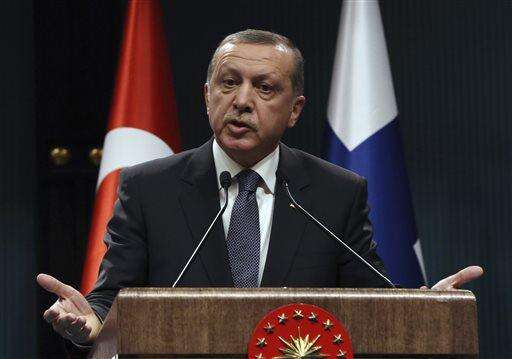
FILE - In this Oct. 13, 2015, file photo Turkish President Recep Tayyip Erdogan speaks to the media during a news conference in Ankara, Turkey. As extremist violence and political uncertainty cast a shadow over Turkey, voters are looking for a Nov,1, 2015, parliamentary election to usher in stability. The ballot comes at a sensitive time for Turkey, a key Western ally that has major issues to navigate. (AP Photo/Burhan Ozbilici)
The Associated Press
In this Wednesday, Oct. 14, 2015 photo, a painting of Turkish Republic founder Mustafa Kemal Ataturk, center, is seen at an art shop in Istanbul, ahead of the Nov. 1 general elections. The sign reads in Turkish: "Sales." As extremist violence and political uncertainty cast a shadow over Turkey, voters are looking for the parliamentary election to usher in stability. The ballot comes at a sensitive time for Turkey, a key Western ally that has major issues to navigate. (AP Photo/Lefteris Pitarakis)
The Associated Press
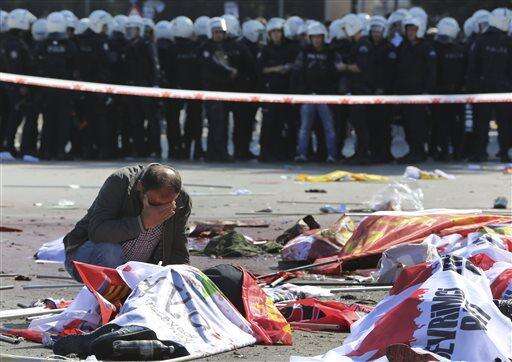
FILE - In this Oct. 10, 2015 file photo, a man cries over the body of a victim who, along with others, is covered with flags and banners at the site of an explosion in Ankara, Turkey's deadliest attack in years. As extremist violence and political uncertainty cast a shadow over Turkey, voters are looking for Nov. 1 parliamentary election to usher in stability. The ballot comes at a sensitive time for Turkey, a key Western ally that has major issues to navigate: It faces rising instability in neighboring Syria and Iraq, a refugee crisis that is spilling into Europe and also doubts about the countryâs once booming economy. (AP Photo/Burhan Ozbilici, file)
The Associated Press
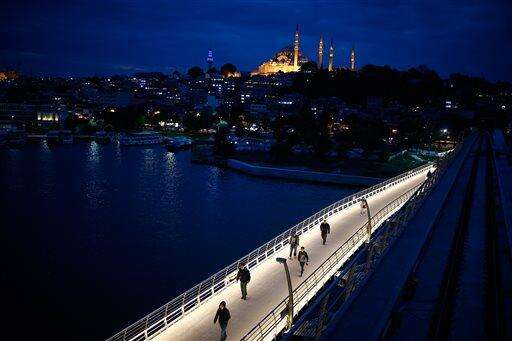
In this Tuesday, Oct. 27, 2015 photo, people walk over a Golden Horn bridge in Istanbul, with the Suleymaniye Mosque in the background. As extremist violence and political uncertainty cast a shadow over Turkey, voters are looking for Nov. 1. 2015, parliamentary elections to usher in stability. The election is a redo of June elections in which the ruling Justice and Development Party, or AKP, stunningly lost its majority. The ballot comes at a sensitive time for Turkey, a key Western ally that has major issues to navigate. (AP Photo/Emrah Gurel)
The Associated Press
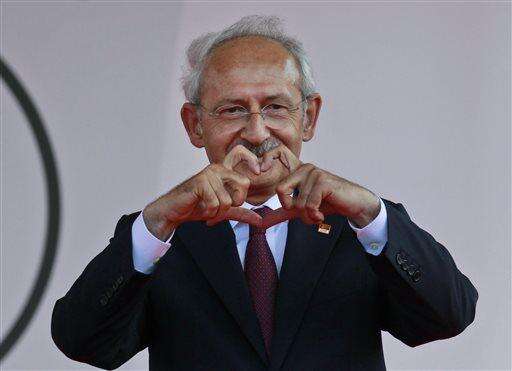
FILE - In this June 2, 2015, file photo, Kemal Kilicdaroglu, leader of Turkey's main opposition Republican People's Party (CHP), makes a heart shape with his hands after delivering a speech at a rally in Istanbul. As extremist violence and political uncertainty cast a shadow over Turkey, voters are looking for Nov. 1 parliamentary election to usher in stability. The election is a redo of June elections in which the ruling Justice and Development Party, or AKP, stunningly lost its majority. The ballot comes at a sensitive time for Turkey, a key Western ally that has major issues to navigate. (AP Photo/Mehmet Guzel, file)
The Associated Press
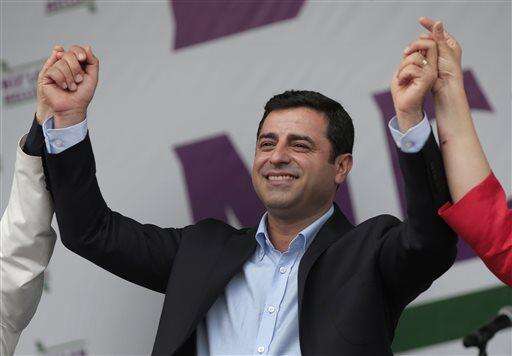
FILE - in this June 8, 2015, file photo, Selahattin Demirtas, co-chair of the pro-Kurdish Peoples' Democratic Party, (HDP), celebrates at a rally in Istanbul a day after the elections. As extremist violence and political uncertainty cast a shadow over Turkey, voters are looking for a Nov 1. 2015, parliamentary election to usher in stability. The election is a redo of June elections in which the ruling Justice and Development Party, or AKP, stunningly lost its majority. The ballot comes at a sensitive time for Turkey, a key Western ally that has major issues to navigate. (AP Photo/Lefteris Pitarakis, file)
The Associated Press